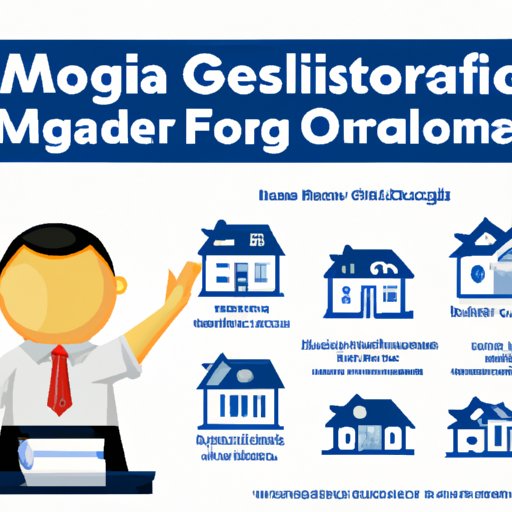Introduction
A mortgage loan officer is a professional who assists borrowers in obtaining financing for their home purchases. They are responsible for evaluating loan applications and helping borrowers understand the terms and conditions of their loan. The goal of a mortgage loan officer is to ensure that borrowers have the resources they need to make informed decisions about their financial future.
In this article, we will explore what it takes to become a mortgage loan officer. We’ll discuss the qualifications and requirements for entering the field, different types of mortgage loans, skills required to be successful, tips on how to market yourself, steps to take when processing a loan, advice for dealing with difficult clients, and best practices for complying with industry regulations.
Qualifications and Requirements for Becoming a Mortgage Loan Officer
The qualifications and requirements for becoming a mortgage loan officer vary by state. Generally, most states require mortgage loan officers to have at least a high school diploma or equivalent. Some states may also require additional education, such as courses in finance or real estate.
In addition to educational requirements, most states require mortgage loan officers to be licensed. This typically involves completing pre-licensing courses and passing a state exam. Depending on the state, mortgage loan officers may also be required to pass a background check and/or fingerprinting.
Mortgage loan officers must also be knowledgeable about state and federal laws regarding lending practices. In some cases, they may need to take additional tests to demonstrate their understanding of applicable laws and regulations.

Different Types of Mortgage Loans
When working as a mortgage loan officer, you will need to be familiar with the different types of mortgage loans available. These include conventional loans, FHA loans, VA loans, and jumbo loans.
Conventional loans are loans that are not insured by the government. They typically require a down payment of at least 20% and have more stringent qualification requirements than other types of loans.
FHA loans are loans that are insured by the Federal Housing Administration (FHA). They typically require a lower down payment and have more flexible qualification requirements than conventional loans.
VA loans are loans that are guaranteed by the Department of Veterans Affairs. They allow eligible veterans and active duty military personnel to purchase a home with no money down.
Jumbo loans are loans that exceed the maximum loan amount set by the FHA. They often require a higher credit score and a larger down payment than other types of loans.
Skills Required to be Successful in the Field
To be successful as a mortgage loan officer, you must possess certain skills. First, you must have a thorough understanding of financial regulations and laws. You should also be knowledgeable about the housing market and changes in interest rates. Additionally, you must be able to communicate effectively with borrowers and other professionals.
You should also have strong analytical skills and be able to evaluate financial information quickly and accurately. Finally, you should be organized and detail-oriented to ensure that loan applications are processed in a timely manner.

Tips on How to Market Yourself as a Mortgage Loan Officer
When marketing yourself as a mortgage loan officer, there are several strategies you can use. Utilizing social media can be an effective way to reach potential clients. Participating in networking events, such as real estate conferences or trade shows, can also be beneficial. Developing relationships with real estate agents and other professionals in the industry can help you gain referrals.
It’s also important to stay up-to-date on industry trends and changes. Reading industry blogs and magazines, attending webinars, and joining online discussion groups can help you stay informed and maintain an edge over your competitors.

Steps to Take When Processing a Mortgage Loan
When processing a mortgage loan, there are several steps that must be taken. First, you must pre-qualify the borrower. This involves gathering information about their income, assets, and credit history. Once the borrower is pre-qualified, you must gather the necessary documentation, such as pay stubs and bank statements.
Next, you will submit and process the application. This includes reviewing the documents and ensuring that all of the information is accurate. After the application is approved, you will negotiate the terms and conditions of the loan. Finally, you will close the loan and provide the borrower with the necessary paperwork.
Advice for Dealing with Difficult Clients
Dealing with difficult clients is an inevitable part of being a mortgage loan officer. It’s important to remain professional at all times and listen attentively to the client’s concerns. Providing clear explanations of the loan process can help alleviate any confusion or frustration the client may have. Offering solutions to any issues that arise can help build trust and show that you are invested in the client’s success.

Best Practices for Complying with Industry Regulations
Following industry regulations is essential for mortgage loan officers. It’s important to understand applicable laws and stay current with industry standards. Adhering to ethical guidelines and avoiding any conflicts of interest can help protect both the borrower and the lender.
It’s also important to keep detailed records of all transactions. This includes documenting all conversations with clients and maintaining accurate records of loan applications. Doing so can help protect you from any legal issues that may arise.
Conclusion
Becoming a mortgage loan officer can be a rewarding career choice. To be successful in the field, you must meet the qualifications and requirements, understand the different types of loan products available, possess the necessary skills, and adhere to industry regulations. By utilizing the tips and advice outlined in this article, you can position yourself for success as a mortgage loan officer.
(Note: Is this article not meeting your expectations? Do you have knowledge or insights to share? Unlock new opportunities and expand your reach by joining our authors team. Click Registration to join us and share your expertise with our readers.)
